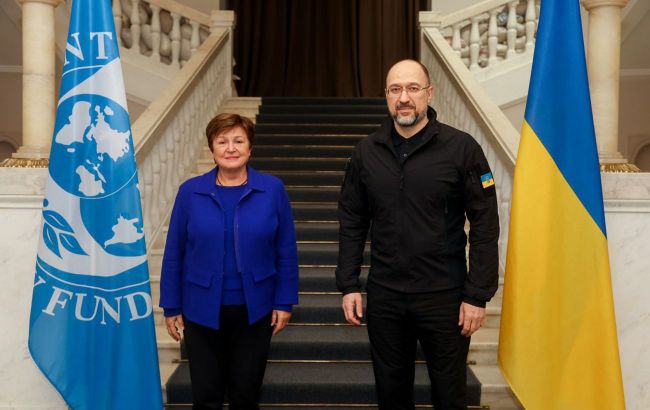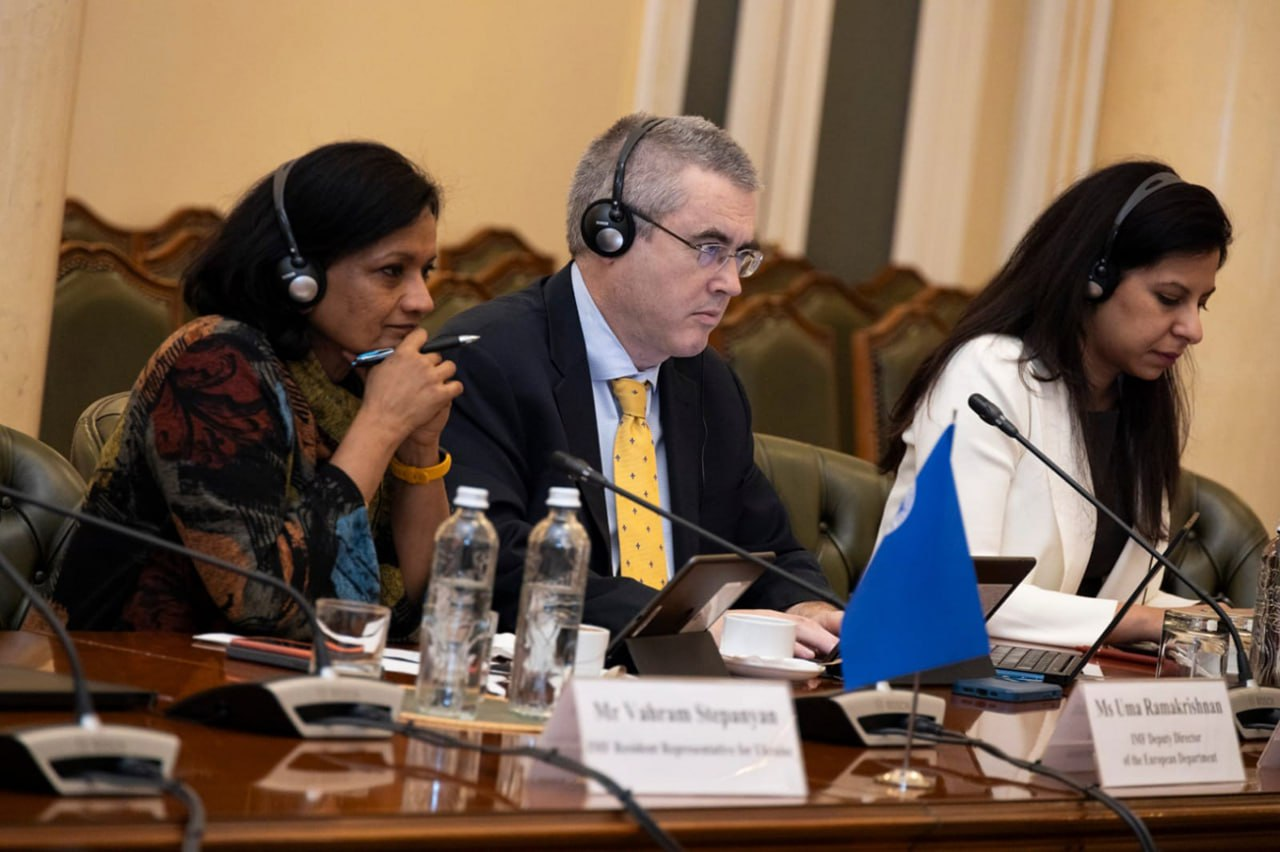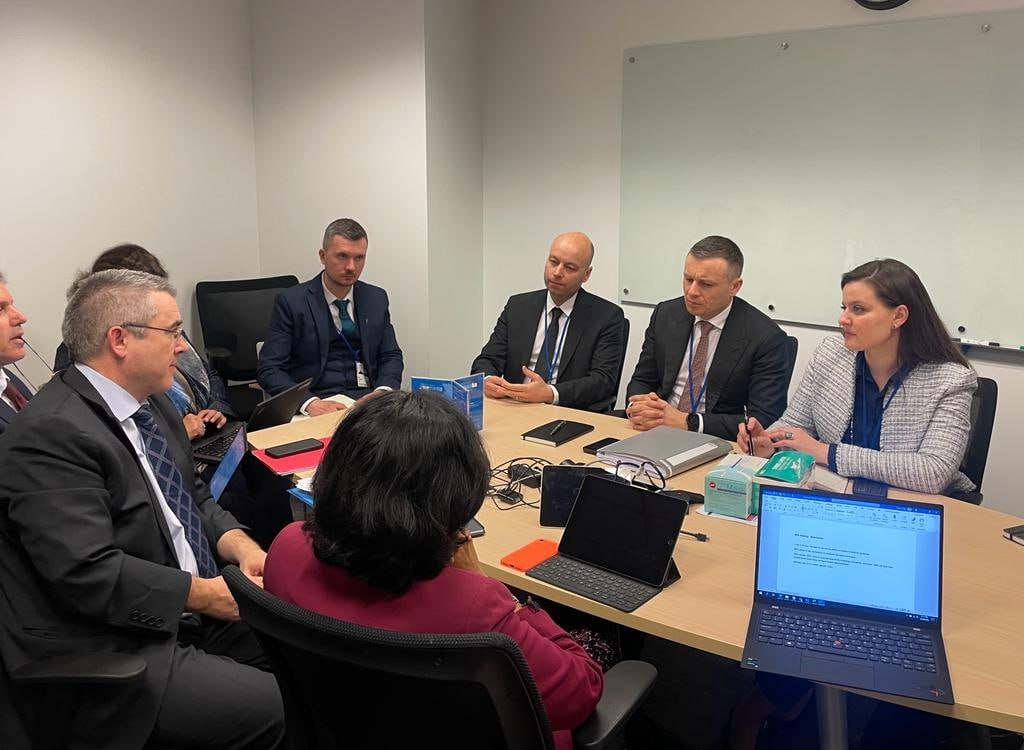New tranche and plan B for Ukraine's state budget: What to expect from negotiations with IMF
 Prime Minister of Ukraine Denys Shmyhal and IMF chief Kristalina Georgieva (photo: t me Denys_Smyhal)
Prime Minister of Ukraine Denys Shmyhal and IMF chief Kristalina Georgieva (photo: t me Denys_Smyhal)
Ukraine stands poised for a successful review of its IMF program, signaling the potential release of the fourth tranche totaling $900 million. Negotiations may also address concerns regarding the absence or reduction of funding from the United States, potentially necessitating adjustments to Ukraine's state budget deficit. Insights into the IMF mission's deliberations are detailed in a report by RBC-Ukraine, utilizing information from publicly available sources, exclusive expert commentary, and insights from RBC-Ukraine's sources.
The ongoing fourth review of Ukraine's Extended Fund Facility (EFF) program, amounting to a total of $15.6 billion, commenced jointly with the International Monetary Fund. Since February 17, IMF officials and Ukrainian authorities have convened in Warsaw to assess the program's implementation and adherence to lending conditions. According to RBC-Ukraine, negotiations are scheduled to conclude by the end of the week, culminating in a staff-level agreement and the proposal for Ukraine's fourth tranche approval by the IMF Board of Directors.
Under the four-year EFF program launched in March 2023, Ukraine has already received $4.5 billion across three tranches, with an expected disbursement of $5.4 billion in 2024 spread over four tranches.
Prior to the review, Ukraine was required to fulfill all "structural benchmarks," or conditions outlined in the cooperation memorandum. Three such benchmarks were due before the fourth review, including the approval of the National Revenue Strategy, the passage of a law to enhance the independence of the Specialized Anti-Corruption Prosecutor's Office, and the revision of procedures for managing state investments.
As of today, all conditions have been met, setting the stage for a positive evaluation by the mission. This marks the second consecutive review where Ukraine has met all creditor requirements. In December, all structural benchmarks were also fulfilled, albeit with some delays.
"I believe the mission will proceed smoothly," commented Vitalii Vavryshchuk, Head of Macroeconomic Research at ICU Group, to RBC-Ukraine.
Oleksandr Parashchii, Head of the Analytical Department at Concorde Capital investment company, also expressed confidence in Ukraine's compliance with IMF program terms.
"Formally, we have fulfilled all three benchmarks," he said.

Representatives of the IMF mission to Ukraine (photo: NBU archive)
No plans to increase the tranche volume
The forthcoming tranche is expected to amount to $900 million. Parashchii suggests that in the absence of external financing, consideration should be given to increasing its size.
"Even if the United States were to provide funds, it is unlikely to be soon. Therefore, discussing substantial disbursements for the next tranche from the IMF would be premature. It would help in the current situation, given the very limited international assistance we received in January-February. Nevertheless, the next tranche is planned for $2.2 billion," he said.
However, there are currently no plans to increase the tranche size, according to a source familiar with the negotiation agenda.
Much hinges on the resolution of Ukraine's financing from the United States, which has been absent for the past five months. RBC-Ukraine has previously highlighted the risks of further delays in receiving funds from Ukraine's key partner.
No adjustments to the program expected
The IMF program is directly linked to financing from the EU and the US, with significant importance placed on the amount and regularity of their disbursements. The €50 billion four-year Ukraine Facility from the EU is set to commence in March, with minimal risk of disruption. However, the final funding amount for 2024 remains unknown pending approval by the European Parliament at the end of February. Funding for the current year could range from €9 to €18 billion.
Regarding the US, there is currently no clarity on financing for Ukraine, with discussions stalled in Congress. Nevertheless, assurances from the White House suggest that Ukraine will not be left without the necessary support.
Should US funding fail to come, Ukraine will need to seek alternative sources of financing, with preparations for it already underway. However, pending a definitive decision from the US, the IMF program will remain unchanged.
"Until a specific decision from the US is made, the program's underlying assumption remains that funds will be allocated," said a source familiar with the IMF negotiation plan.
The possibility of discussing Ukraine's financing in the face of delays or reductions in external budgetary inflows may arise during the mission. However, there are currently no plans to adjust the program due to these risks, the source added.

Negotiations between representatives of the Ukrainian government and IMF experts (photo: archive www.mof.gov.ua)
Will Ukraine face budget deficit cutbacks?
According to reports, the ongoing mission might raise questions about reducing the budget deficit amidst a shortage of funds. Ukraine's budget deficit for 2024 stands at approximately $40 billion and is mainly covered by external borrowing and grants. If sources of coverage are lacking, deficit reduction will be necessary. This entails either increasing revenue from both domestic and external sources or cutting expenses, or a combination of both.
"Without the United States, we'll be short by 3-5 billion for this year. And it's impossible to collect taxes and fees in such an amount. Which is why we will still need to address the issue of deficit financing," noted Parashchii.
Vavryshchuk is confident that the problem of delayed funding will undoubtedly be raised during negotiations.
"Of course, the budget issue will be crucial, but it's unlikely that the IMF anticipates no financial assistance from the US at this stage. If the scenario where funding is indeed available is the baseline, then the question of deficit reduction will not be discussed now (within the framework of program discussion - ed). It will most likely be an informal Plan B. However rewriting the IMF program based on the assumption that there will be no financial assistance from the US would be inappropriate at this time. After all, the chances of its approval are quite high," Vavryshchuk believes.
It's unlikely to replace the absence of American funds. Therefore, it will probably be necessary to both cut expenses and increase domestic financing through the issuance of government bonds.
"In a scenario without American grants, it will be necessary to reduce the budget deficit. Government bonds or emissions will not help because it will affect debt sustainability, which is one of the main conditions of the program," said the source.
Thus, to balance the budget in the absence or reduction of funding, a configuration of actions will have to be developed to increase revenue and reduce expenses. Could this involve tax increases and if so, which ones? To what extent will government bond issuance be necessary? Will there be cutbacks to government programs or any other steps taken? Perhaps, there will be more clear answers in March.
Meanwhile, the government is attempting to utilize existing mechanisms to accelerate budget filling rates. In particular, state-owned enterprises have been asked to expedite the payment of profits to the state budget. The head of one of them announced that the government has requested all payments to be made by the end of February.

